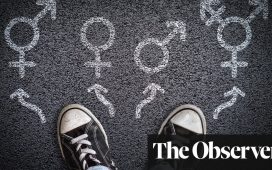As we confront, head-down, a global health crisis, higher education prognosticators are speculating on what the future holds (spoiler alert: it’s dire). Even before Covid-19, a skeptical public was understandably questioning the relevance, value and integrity of traditional college. Now, many schools also face unanticipated revenue loss, volatile enrollments and an unpredictable economy and job market. No surprise, then, that predicting the number of schools that will close is the new, cool sport.
If, however, we resist this urge to predict what will happen and instead focus on the moment we’re in, the necessity in a democratic society of college education done right comes sharply into view.

College students climb staircases in an airy academic building.
Think of some of the larger challenges we confront in this crisis. Much of the public and many policy makers seek multiple perspectives on the threat. We need to grasp how this virus spreads and how other nations and communities are responding. And, even as we recognize how much we don’t know, we all need to collaborate in ways large and small to create an effective team defense.
Education matters here. At its best, traditional college offers a range of experiences that engage the entire person while also developing expertise in a specific field. These experiences, the core of which are academic classes, also include (among others) international study or work, residential life, athletic competition, doing original research, campus employment, internships, participation in communities of faith, civic engagement, and leading student organizations. With the help of advisors and mentors, each student charts a path, selecting which opportunities best serve her, that prepares her for a meaningful life and career within a broader human community.

With the ability to make connections between disparate topics and tackle unfamiliar challenges, … [+]
Challenging academic courses, no matter what the field, cultivate analytical ability and reasoning—students learn to use language with precision, develop and apply appropriate analytical frameworks to complex problems, distinguish between unlike things (facts from feelings, for example, or assumptions from truths), formulate viable research questions, and draw conclusions from complex and disparate data. These transferable habits—at Davidson where I work we call this a “disciplined and creative mind” — prove useful no matter what career path a person chooses or how many times that career path swerves.
Courses in combination with other educational experiences develop additional capabilities, for example an ability to communicate effectively, work on a team, navigate unfamiliar circumstances and recover from a setback. The residential setting, which brings together people from different backgrounds and with different convictions and holds them accountable for building a community, cultivates other crucial human qualities like integrity, self-awareness, empathy, moral courage, intellectual humility, and a sense of civic obligation. Davidson calls these qualities “humane instincts.”
A student who has interned at a hospital, worked in Zambia, taken a biochemistry and an anthropology course, majored in economics and acted in a Shakespeare play or helped lead a soccer team could effectively analyze the broad ramifications of a pandemic because that student could see it from many angles, grasp and imagine its multiple possible trajectories, and come up with ways of combatting it.

A Davidson College student in a production of “Hamlet.”
I would be the last person to claim that traditional college always lives up to its educational aims, but let’s not confuse this falling short with the foundational importance of the mission. As our country and world face a potentially catastrophic health crisis, we need people in every profession who use language with precision, who distinguish fact from feeling, who create appropriate analytical frameworks and who ask constructive questions. We need people whose moral courage and empathy and powerful words inspire the rest of us to act in the best interests of our communities.
So instead of predicting closures, let’s dramatically expand capacity, using every tool we have to reach many more people at dramatically lower cost. We can do this by analyzing more precisely when and how traditional, residential education effectively develops individual skills and capabilities. How exactly do students learn to navigate unfamiliar circumstances, and can we efficiently offer such experiences to many more people? When college students do learn to distinguish fact from feeling and personal lived experience from general truth, how does that happen and can we give many more people these opportunities? Which experiences nurture intellectual humility and how can we use new tools and pedagogies to expand access to these?
Democratic societies rely on citizens who can imagine multiple possible futures that we together can create. This will be true when we’re through this health crisis and no matter how many institutions go under. Figuring out how to deliver at scale what traditional college claims to do seems not only worthwhile but essential.


